Google’s December 2020 core update was big, even bigger than May 2020, say data providers
The update rolled out on Dec 3, but the impact was mostly felt on Dec. 4.
On Dec. 3, Google began rolling out the December 2020 core update. Early data seems to show the rollout was mostly felt the following day, but as Google has said, it can take up to a couple of weeks to fully roll out. Based on everything we have seen so far this update is a very big broad update, even possibly bigger than the one seven-months ago, the May 2020 core update — and that one was very big.
We asked several data companies that track Google’s search results to send us impressions of this update and they mostly all agree, this was a big update that was significantly felt across almost all verticals.
The facts. What we know from Google, as we previously reported, is that the December 2020 core update started to roll out around 1:00pm ET on Thursday, Dec. 3. Like all core updates, this was a global update and was not specific to any region, language or category of web sites. It is a classic “broad core update” that Google releases every few months or so. In this case, it was the longest stretch since a confirmed broad core update, one that took just under seven-months, as opposed to the typical three-month time frame.
Previous updates. The most recent previous core update was the May 2020 core update, that update was big and broad and took a couple of weeks to fully roll out. Before that was the January 2020 core update, we had some analysis on that update over here. The one prior to that was the September 2019 core update. That update felt weaker to many SEOs and webmasters, as many said it didn’t have as big of an impact as previous core updates. Google also released an update in November, but that one was specific to local rankings. You can read more about past Google updates over here.
This December 2020 update. This one is big. We received data from several search data companies, and they all show that this update was very big and substantial. This update seems to be slowing down in terms of the fluctuations we would see from this update over time, with the biggest changes on Friday, December 4th.
Timing the update. There has been concern about the timing of this update, that it was released a couple of weeks prior to the holiday season. Google said it was done after the Thanksgiving season, after Black Friday and Cyber Monday but before the holidays. But for some, especially those that make a lot of their sales right before the holidays, this update can be devastating to their business.
Data providers on the December 2020 core update
RankRanger. The folks from RankRanger said that this December 2020 update was a “major one,” telling us it was that while the May 2020 update was big, the “December update showed even more changes than the May update in some areas, especially in the top three results.”
Here is how the December update compared to the May update:
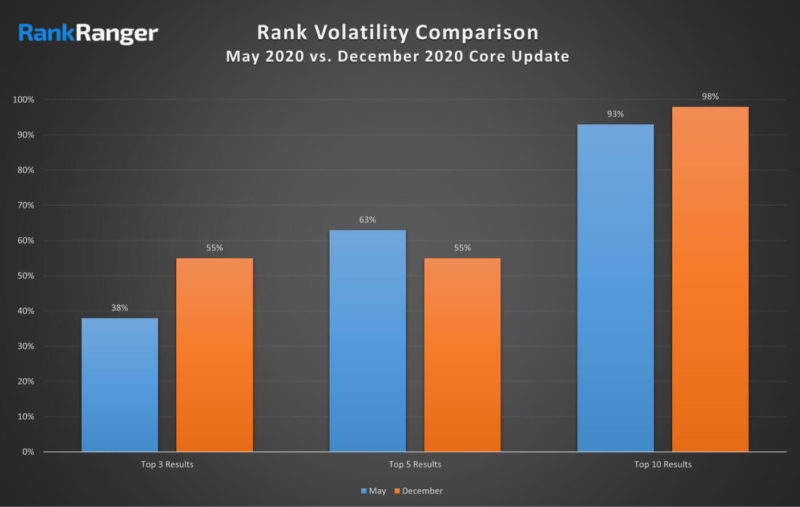
The top twenty positions in Google that RankRanger tracks, the fluctuations more than doubled in comparison to the May update.

If you look at the data across industry, you will see fairly even fluctuations, with slightly lower levels of fluctuation in the top three and top five results in the travel niche, according to RankRanger’s data.
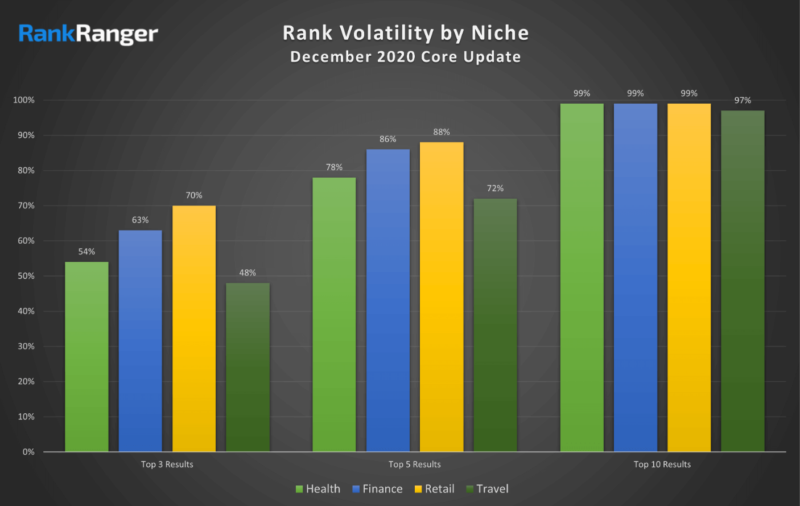
SEMRush. Yulia Ibragimova, Olga Andrienko and the SEMRush team prepared a lot of data for us on this update. SEMRush said that this update was mostly felt on Friday, December 4th. Desktop search changes were most felt in the health, real estate, travel, finance, law and government and on mobile search health, law and government, jobs and education, pets & animals, real estate. The SEMRush sensor tracking tool is showing a score of 9.4 on Friday December 4th, the May 2020 core update was also scored that by SEMRush but the January update was closer to 8.

Here is the SEMRush volatility by category:
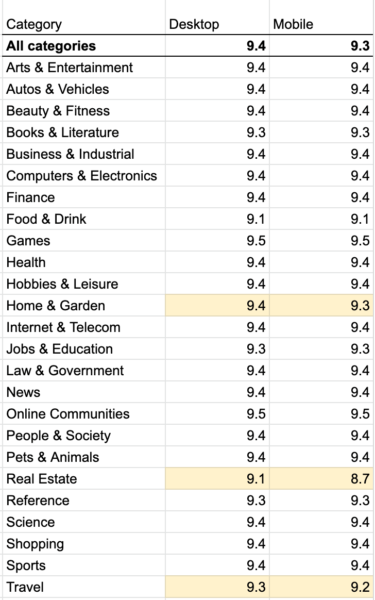
SEMRush also shared the winners and losers of this update. The winners were zoominfo.com, whitepages.com, linkedin.com, ebay.com, vimeo.com, loginbrain.com yahoo.com, foursquare.com, and businesswire.com. The losers were yellowpages.com, newsbreak.com, gettyimages.com, wish.com, echovita.com, urbandictionary.com, local.com, dnb.com, and aliexpress.com.
Searchmetrics. Marcus Tober from Searchmetrics told us “as Google announced, it’s clear that this Core Update is still rolling out. However, we can already see some clear shifts in rankings in typical areas related to E-A-T and content – music, health, finance, news, and ecommerce. Interesting is that some winners and losers from the last Core Update in May have gained or lost visibility, but only a few of them. Spotify and Twitch, who suffered major losses with the last update, have so far not yet shown signs of recovering. But it could be that Google is carefully releasing the update in multiple iterations to test the results. Or it also might be the case that the impact of the update is less than other updates with respect to the holiday season. In 1 or 2 weeks we will know more.”
Searchmetrics published some data on its web site as well, including comparing decrease and increase in rankings in May 2020 to December 2020:
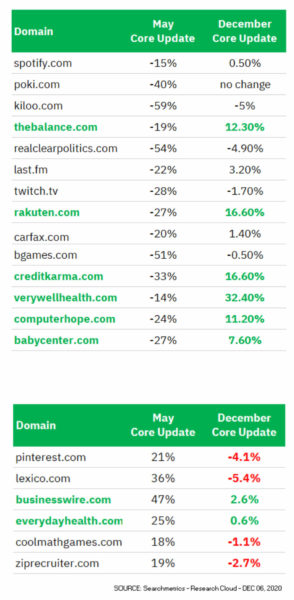
Searchmetrics also published its own winners and losers. The early winners are valuepenguin.com, verywellhealth.com, celebritynetworth.com, vudu.com, songmeaning.com, zoominfo.com, realsimple.com, creditkarma.com, cliffnotes.com, elle.com and azquotes.com. The early losers are wsfb.com, heart-music.com, cocolate.com, soundguys.com, gearbest.com, thechive.com, medbroadcast.com, cloverlyrics.com, lyriccenter.com and theasaurus.net.
Sistrix. Sistrix also published some data on this update where Johannes Beus, the CEO of Sistrix, asked if this was an early Christmas present from Google. The company said it has seen the first shifts in the search results since Friday afternoon, central Europe time. These first reactions are viewable in the daily SISTRIX data from Saturday (December 5th).
The data from this company showed that dictionaries and encyclopedias saw large losses here. Why? The company said it comes as no surprise because of the new quality raters guidelines specifically called them out in the last update.
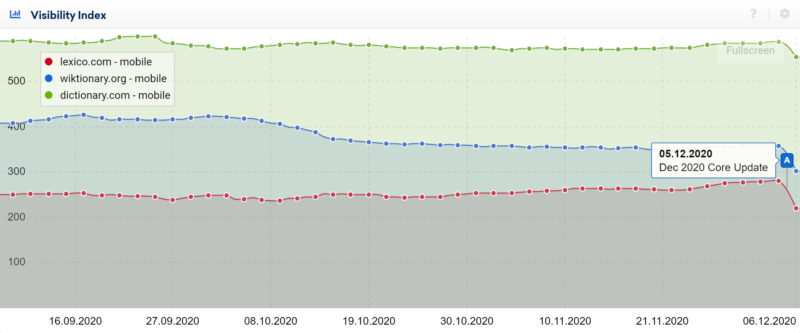
This company also published its winners and losers. The winners were ducksters.com, songmeanings.com, babycenter.com, nameberry.com, verywellhealth.com, newsworldencyclopedia.org, mn2s.com, zoominfo.com and cazoo.co.uk. The losers were tenor.com, littlewoods.com, ents24.com, wish.com, fantasticfiction.com, wikiwand.com, lexico.com, whosampled.com and secondhandsongs.com.
The data match? There is some overlap across these data providers but each data provider tracks different metrics, different sites, different keyword sets. So that is why there is not an exact match.
The SEO community. There is no lack of discussion within the SEO community in both the online discussion forums and on social media around this update. Some people claimed to have lost over 40% of their Google organic traffic, while others did well from this update. I’ve even seen some claim over 150% traffic increases from Google. You can read some of the community chatter on the Search Engine Roundtable.
What to do if you are hit. Google has given advice on what to consider if you are negatively impacted by a core update in the past. There aren’t specific actions to take to recover, and in fact, a negative rankings impact may not signal anything is wrong with your pages. However, Google has offered a list of questions to consider if your site is hit by a core update. Google did say you can see a bit of a recovery between core updates but the biggest change you would see would be after another core update.
Why we care. It is often hard to isolate what you need to do to reverse any algorithmic hit your site may have seen. When it comes to Google core updates, it is even harder to do so. If this data and previous experience and advice has shown us is that these core updates are broad, wide and cover a lot of overall quality issues. The data above has reinforced this to be true. So if your site was hit by a core update, it is often recommended to step back from it all, take a wider view of your overall web site and see what you can do to improve the site overall.
Related stories
New on Search Engine Land